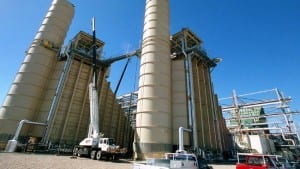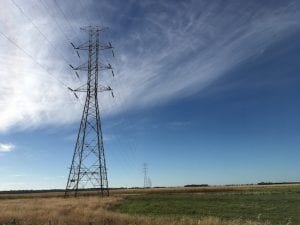It’s more than a little ironic that community owned retailer Enova Energy, borne out of the community campaign to stop coal seam gas mining in the northern rivers region of NSW, should fall victim to the very industry it was trying to stop.
Enova on Tuesday called in voluntary administrators because it could no longer survive in the energy crisis that has seen wholesale prices soar, and in a market deliberately designed to protect the huge fossil fuel incumbents.
The failure is yet another indictment on the state of Australia’s energy market, where the rules support an oligopoly of energy giants that control both sides of the market. The “gentailing” structure is unique to Australia, and makes it almost impossible for new competitors to emerge.
The tragedy of Enova is that it was a pioneering company that was seeking to do the right thing.
The idea was formed amid the community protests against CSG mining at Bentley. It is community owned, it directs funds back into community projects, it supports rooftop solar, it is focused on 100 per cent renewables, and is seeking to find solutions – such as solar gardens – for those renting or living in apartments.
Its founders and management knew it was not going to be easy, and they nearly came to grief a year after their launch when the abrupt closure in 2017 of the country’s dirtiest power generator, Hazelwood, caused a huge spike in wholesale prices.
But they thrived, and expanded into Sydney and other parts of NSW and south-east Queensland, accumulating more than 13,000 customers along the way. It was a joint winner of Greenpeace Australia Pacific’s 2022 Green Electricity Guide.
But it was the soaring wholesale electricity prices – caused by Australia’s ongoing dependence on coal and gas – and the structure of the market that favours large incumbents – that finally did them in.
Enova co-founder and former chairperson Alison Crook has no doubt where the fault lies – in the design of a market that allows the big “gentailers” to dominate and play both sides of the market, generation and retailing. If the profit falls on one side of the business, it usually rises on the other.
The likes of Enova have been caught between a rock and a hard place by this structure, and their ability to be clever and nimble was further foiled by the introduction of the so-called Default Market Offer under former energy minister Angus Taylor.
The DMO sounds innocent enough, a bit like “technology neutral” energy policies, but it had had the effect of limiting the range of market offers.
Deep discounts were no longer possible because retail prices were capped at the top end (even though the majority of those paying higher prices were wealthy and did so because they couldn’t care less).
When Enova needed to lift its retail prices in response to the soaring wholesale costs, it wasn’t allowed. It was capped.
That has enabled the big gentailers to grab back control of the market. As small retailers struggled, some of the big players have offered deep discounts, backed by the super profits from the large generation portfolios. Competition has been diminished.
Now that Enova has had to call in voluntary administrators, and the future of some other small energy retailers must also be under question, there is a strong case for government intervention.
After all, governments intervene regularly on behalf of the fossil fuel industry. The Victorian government struck a secret deal with EnergyAustralia over its Yallourn generator, ostensibly to “fast-track” its closure by 2032, but possibly to ensure it didn’t close even earlier.
NSW energy minister Matt Kean gave himself special powers last week to ensure that coal mines actually delivered coal to the generators to burn, and help them avoid the debilitating cost of meeting their retail contracts by buying electricity from the wholesale market.
And now the market’s three principal institutions, in the form of the Energy Security Board, are asking state and federal minister to approve a capacity market that favours no one apart from the owners of ageing fossil fuel generators.
That policy is considered so dumb and counter-productive – touting “technology neutrality” when the goal is slash emissions – that even some coal plant owners don’t want it. But it seems almost inevitable.
A week ago, the market bodies intervened to impose a market cap to stop the runaway prices on the wholesale market caused by soaring gas and coal prices, and the break down of many of the country’s so-called “reliable” coal generators.
It’s a mechanism ostensibly designed to protect consumers, but the biggest beneficiaries may have been the coal generators themselves, particularly the companies that owned plants either broken or starved of fuel by floods and mine problems.
Their inability to produce power at their broken down and fuel starved coal generators contributed directly to the runaway market prices and forced them into the market to buy electricity at very high prices.
That led to losses in the tens of millions of dollars that could only be brought under control under the administered price cap and the subsequent market suspensions.
Under those regimes, their exposure to the highest prices were reduced, and they were guaranteed their money back if the cost of their own generation exceeded the price cap. It was the perfect arrangement – for a large fossil fuel power house.
EnergyAustralia revealed the extent of their losses earlier this week, and that did not include the dramatic first weeks of June, when prices spiked even higher.
Origin has also warned of big losses because it could no longer source enough coal for its Eraring coal generator, and had to buy on market. No worries, it’s making a killing out of the soaring gas price.
Crook says she is frustrated with regulators and policy makers.
“Everybody has a vision that’s large scale,” she says in an interview on the Energy Insiders podcast (to be published Thursday).
“And they simply don’t understand that small can be beautiful. The ability to decentralise and have distributed energy means that you can have virtually self sufficient regions, which can be using that grid that we’ve all paid for, but only up to the point where they need to.
“So you can have much more resilient regions with little bits of the country down in Gippsland and the Northern Rivers being self sufficient, having their own community scale solar farms, owning and sharing batteries at the end of streets.
“If they had been willing to allow changes to the regulations to allow people to share energy, if they’d been willing to allow the system to take energy from the house to a battery and then back again, without charging you for taking it both ways, then we could have had self sufficient resilient regions.
“But nobody wants to see that …. it’s been all about we’re going to build big plants. We need the government to make sure we’ve got big transmission. The taxpayer can pay for that. And and then we can control it. The price flow. So it’s always been energy, it used to be always energy in energy out.
“Honestly, it’s been a case of the big players dominating the thinking of both the regulators and governments. And we found it almost impossible to get that message through. People kept saying, ‘yes, yes, Alison, we know that. We’re going to have more distributed energy, but then we’ll have to charge you to export’.”
In a separate Facebook post, Crook noted:
The final irony is that Enova has effectively lost its licence and under the “retailer of last resort” rules administered by the market regulator, its customers will be distributed to other retailers.
Guess which ones they will be assigned to: Origin Energy and EnergyAustralia.
See also: Hardly anyone supports the ESB’s capacity market. So why is it still on the table?
And: Energy retailer cashes out of market after telling customers to go elsewhere
Note: The author is a customer of Enova Energy.










